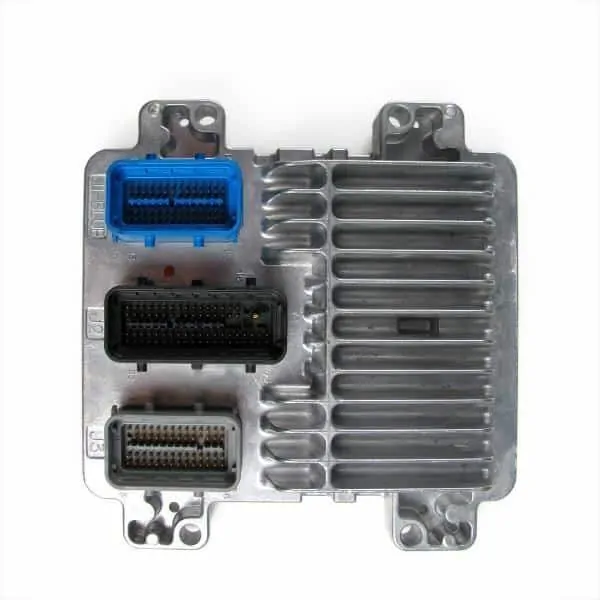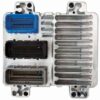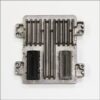Restore Peak Performance to Your GM Vehicle
Is your 2007 Buick Rainier, Chevy Trailblazer, or GMC Envoy suffering from frustrating and unpredictable engine problems? Issues like a persistent Check Engine Light, sudden stalling, poor fuel economy, or a complete no-start condition often point to a single, critical component: a failing Powertrain Control Module (PCM). This module, often called the Engine Control Module (ECM), is the brain of your vehicle’s engine. When it malfunctions, it can cause a cascade of performance issues that can leave you stranded. This replacement PCM, part number 12602010 (interchangeable with 19210067), is the definitive solution to get your vehicle running reliably again.
Common Symptoms of a Failing PCM
If you’re experiencing any of the following issues, a faulty engine computer is the likely culprit. A failing module can manifest in various ways, from subtle performance degradation to critical failures. Here are the most common indicators:
- ✔ Check Engine Light: An illuminated CEL is one of the first signs. You may see codes related to module communication errors, sensor failures, or processor faults.
- ✔ Engine Stalling or Misfiring: The engine may stall unexpectedly while driving or at idle. You might also notice rough idling or random engine misfires.
- ✔ No-Start Condition: The engine cranks but refuses to start. This can happen if the PCM is not properly controlling the fuel injectors or ignition coils.
- ✔ Poor Fuel Economy: A malfunctioning PCM can’t efficiently manage the air-fuel mixture, leading to a noticeable drop in your vehicle’s gas mileage.
- ✔ Failed Emissions Test: Incorrect engine management will almost certainly cause your vehicle to fail a smog or emissions inspection.
- ✔ Erratic Transmission Shifting: The PCM works in conjunction with the transmission controller. A faulty module can cause harsh shifting, delayed engagement, or getting stuck in one gear.
From the Diagnostic Bay
We had a 2007 Chevy Trailblazer with the 4.2L engine come into the shop with a ghost of a problem. The owner reported that it would randomly stall at stoplights, but only after it had been driven for over 30 minutes. There were no consistent trouble codes, just a history of random communication errors. We checked everything—fuel pressure, ignition system, sensors—and it all tested fine. On a hunch, we monitored the PCM’s live data on an extended test drive. As the engine bay heated up, we saw the processor data stream start to lag and then drop out entirely, causing the stall. A hairline crack on the circuit board, only visible under magnification, was expanding with heat and breaking the connection. We installed one of these VIN-programmed PCMs, performed the security relearn, and the Trailblazer ran perfectly. It’s a classic example of how heat and vibration eventually take their toll on these critical electronics.
The Right Solution: A VIN-Programmed 2007 Rainier PCM
Simply swapping a used computer from another vehicle won’t work. Modern vehicle electronics are tied to a specific Vehicle Identification Number (VIN) for security and operational purposes. Our service eliminates the guesswork and the need for expensive dealership programming. When you order this 2007 Rainier PCM, we flash it with the latest, most stable software updates directly from GM, tailored specifically to your vehicle’s VIN. This ensures that all factory parameters, from fuel injector flow rates to transmission shift points, are perfectly matched to your exact make and model.
Simple Installation Process
While professional installation is always recommended, replacing the PCM is a straightforward process for the experienced DIYer. The module is typically located in the engine bay, either on the driver’s side (LH engine) for models like the Rainier, Trailblazer, and Envoy, or on the passenger side firewall (RH firewall) for models like the Colorado, Canyon, and Hummer H3.
- Disconnect the Battery: Always disconnect the negative battery terminal before working on any electronic components.
- Locate and Remove the Old PCM: Carefully unplug the wiring harness connectors and unbolt the old module from its bracket.
- Install the New PCM: Mount your new, pre-programmed PCM and securely reconnect the wiring harnesses. Ensure the connectors click into place.
- Reconnect the Battery: Reattach the negative battery terminal.
- Perform Security Relearn: In most cases, you will need to perform a security relearn procedure (often called a Passlock or anti-theft relearn) to sync the new PCM with your vehicle’s keys. This procedure can typically be done without special tools and involves a sequence of key turns. Instructions are widely available online for your specific model.
By providing a module that is already programmed for your vehicle, we save you a trip to the dealership and the high costs associated with their programming services. This is the most efficient and cost-effective way to solve your vehicle’s electronic woes and restore its original performance and reliability.
Frequently Asked Questions
Do I need to send my old PCM in?
No, there is no core charge or need to send your old part back to us. This is a direct purchase of a replacement module.
Is this a plug-and-play part?
Almost. The module comes fully programmed to your VIN. However, you will likely need to perform a simple security relearn procedure after installation so the module can recognize your vehicle’s keys. This typically takes about 30 minutes and does not require a scan tool.
What information do you need from me?
After you place your order, you must provide us with your vehicle’s 17-digit Vehicle Identification Number (VIN). We cannot program and ship the module without it. The VIN ensures we load the correct software for your specific options and configuration.
Will this fix my specific problem?
This PCM will correct any issue directly caused by a faulty module. While the symptoms we’ve listed are common indicators of PCM failure, we always recommend a proper diagnosis by a qualified mechanic to confirm the PCM is the root cause of your vehicle’s problems before ordering.
Where is the PCM located on my vehicle?
For vehicles like the Buick Rainier, GMC Envoy, and Chevy Trailblazer with the 4.2L engine, the PCM is located on the driver’s side of the engine. For models like the Chevy Colorado, GMC Canyon, and Hummer H3, it is typically mounted on the passenger side firewall.


